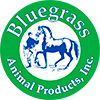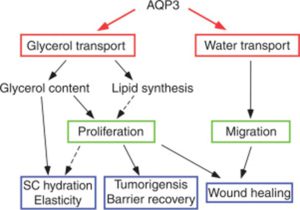Skin Issues and AQP3
Have you noticed your dog or cat scratching a lot? Or maybe their coat is feeling more dry than normal? The skin is the bodies largest organ and skin health can be directly tied to gut health through the gut-skin axis. When the gut microbiota is unbalanced, it can lead to increases in inflammation and systemic autoimmune diseases (1) that can show uncomfortable symptoms such as dry, itchy skin.
Live lactobacillus reuteri has been shown to significantly increase aquaporin 3 (AQP3) gene expression (2). Aquaporin-3 (AQP3) is a membrane transporter of water and glycerol expressed in plasma membranes in the basal layer keratincytes of epidermis in normal skin (3). The levels of AQP3 have shown correlation with glycerol content, skin elasticity, and wound healing (3).
Figure 1 Proposed mechanism for AQP3-dependent skin hydration, wound healing and tumorigenesis (3)
Lactobacillus reuteri and its positive relationship with AQP3 is just one of the ways that L. reuteri can help influence and improve skin health. Lactobacillus reuteri shows a positive impact on skin barrier and antimicrobial action against pathogenic skin bacteria (2). Species specific lactobacillus reuteri is in our Caniotic, Equiotic and Feliotic products to help dogs, horses and cats.
In addition to the antimicrobial action, L. reuteri has been shown to suppress the expression of the inflammatory gene response (4). Inflammatory cells are associated with skin issues, the immune system and all connected through the gut-skin axis.
Resources:
-
Paller A.S., Kong H.H., Seed P., Naik S., Scharschmidt T.C., Gallo R.L., Luger T., Irvine A.D. The microbiome in patients with atopic dermatitis. Allergy Clin. Immunol. 2019;143:26–35. doi: 10.1016/j.jaci.2018.11.015. (link- https://www.ncbi.nlm.nih.gov/pmc/articles/PMC7163929/)
-
Khmaladze, Ia et al. “Lactobacillus reuteri DSM 17938-A comparative study on the effect of probiotics and lysates on human skin.” Experimental dermatology 28,7 (2019): 822-828. doi:10.1111/exd.13950 (link – https://pubmed.ncbi.nlm.nih.gov/31021014/)
-
Mariko Hara-Chikuma, A.S. Verkman, Roles of Aquaporin-3 in the Epidermis, Journal of Investigative Dermatology, Volume 128, Issue 9, 2008, Pages 2145-2151, ISSN 0022-202X, (link – https://doi.org/10.1038/jid.2008.70)
-
Widyarman, Armelia Sari et al. “The Anti-inflammatory Effects of Glycerol-supplemented Probiotic Lactobacillus reuterion Infected Epithelial cells In vitro.” Contemporary clinical dentistry 9,2 (2018): 298-303. doi:10.4103/ccd.ccd_53_18 (link – https://www.ncbi.nlm.nih.gov/pmc/articles/PMC5968699/pdf/CCD-9-298.pdf)


